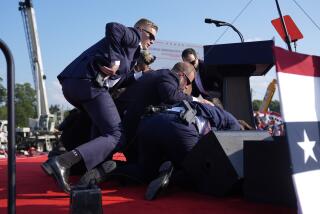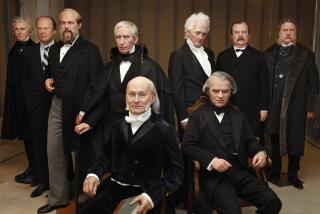The Power of the Presidency Has Come Full Circle
- Share via
Propelled by economic depression and war, the presidency became the uncontested center of American political life in the 30 years after Franklin D. Roosevelt took office. In the almost 40 years since John F. Kennedy’s death, however, the institution has suffered a slow decline. Lyndon B. Johnson’s credibility gap, revelations about White House abuses of power and the end of the Cold War made the country less inclined to look to the Oval Office for leadership.
The Reagan administration represented a temporary pause in the process, but George H.W. Bush’s undistinguished term and Bill Clinton’s impeachment signaled the rise of an imperial Congress and diminished faith in presidential regard for the majority’s needs as opposed to special interests. The 2000 election contest between two of the most lackluster candidates since the vacuous Warren G. Harding defeated the forgettable James M. Cox in 1920 gave no comfort to anyone eager for a resurgence of presidential influence.
Although George W. Bush’s first eight months in office gave little indication that he would reverse the trend, Sept. 11 opened the way to a turnaround. As Theodore Roosevelt believed, nothing serves presidential standing as well as war. Bush’s response to the attacks gave him and the presidency a greater hold on public approval. Bush struck all the right notes in his speeches, unleashed the U.S. military against the Taliban and Al Qaeda in Afghanistan and promised an unrelenting war against terrorists. He reminded Americans of FDR’s rallying cry after Pearl Harbor.
Bush’s high approval ratings were evidence not only of national unity in response to an unprecedented challenge to the nation’s domestic tranquillity but also of genuine feeling that the country could rely on him to see us through the crisis.
Events in the last six months, however, have weakened these convictions. Bush has been learning the truth of Abraham Lincoln’s lament: “I claim not to have controlled events, but confess freely that events have controlled me.”
Osama bin Laden’s disappearance and the amorphousness of the enemy have made it difficult to focus national attention on the war. There is nothing that serves presidential leadership as well as having an identifiable adversary: Woodrow Wilson versus the kaiser; FDR and Winston Churchill against Adolf Hitler, Hideki Tojo and Benito Mussolini; Harry S. Truman battling Josef Stalin; Kennedy versus Nikita Khrushchev. Despite recent administration efforts to associate Iraqi leader Saddam Hussein with the terrorists, neither the American public nor the international community has been persuaded.
Bush also has been unlucky in the events that have recently roiled the economy. Corporate corruption, stock market downturns, mounting deficits and fears of recession have made the war on terrorism a lesser priority. Concerns about a nuclear war between India and Pakistan and the seemingly incessant bloodletting between Palestinians and Israelis, for which the administration has had no convincing answers, have added to the doubts.
The threat of future terrorism in the U.S., the uncertain state of the economy and an eagerness for peace in the Middle East make the country eager for a reinvigorated presidency--a chief executive who not only uses the office as a bully pulpit to rally the nation against terrorism and corporate malfeasance but also identifies policies that can assure a renewed march toward greater prosperity at home and long-term stability abroad.
These challenges will not be easy. Though no one expects miracles, the country always hopes that its leader will make at least incremental advances toward the nation’s highest ideals. Sept. 11 has given renewed urgency to American dreams and the desire for presidential leadership to achieve them.
More to Read
Get the L.A. Times Politics newsletter
Deeply reported insights into legislation, politics and policy from Sacramento, Washington and beyond. In your inbox twice per week.
You may occasionally receive promotional content from the Los Angeles Times.










